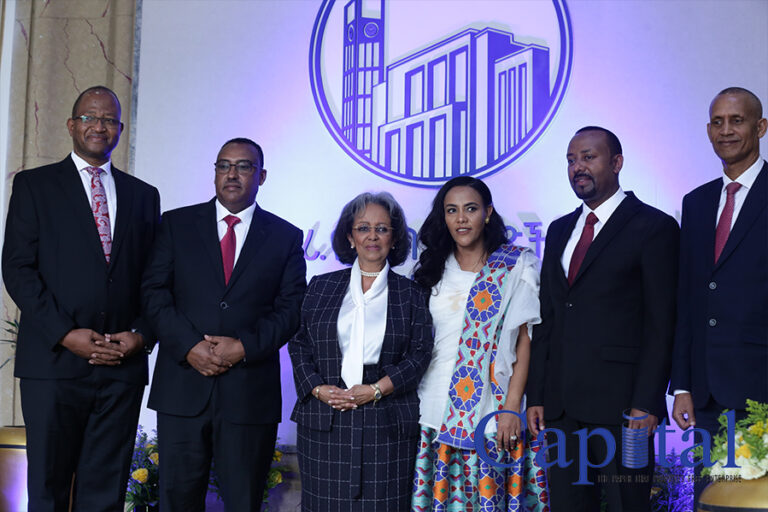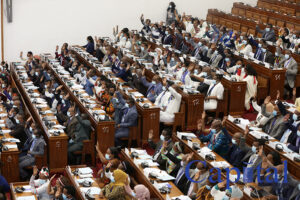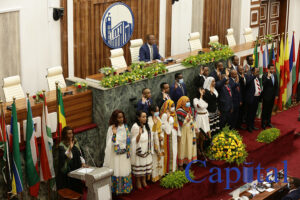The House of People’s Representatives on Wednesday approved the new Cabinet of Prime Minister Abiy Ahmed.
The 22-member Cabinet was endorsed by 342 lawmakers, while one voted against it and 12 abstained. The Cabinet also included three people from the opposition, Birhanu Nega (Education Ministry), from Ethiopian Citizens for Social Justice, Kejela Merdasa (Ministry of Culture and Sport) from Oromo Liberation Front and from Amhara National Movement, Belete Molla (Ministry of Information and Technology).
Demeke Mekonnen retained his position as Deputy Prime Minister and Foreign Minister, and Ahmed Shide as Finance Minister.
Abreham Belay became Defense Minister. He was the minister of technology and innovation in the previous Cabinet.
The ministers were sworn in by the president of the Supreme Court Meaza Ashenafi.
The country’s House of People’s Representatives began its sixth tenure for a five-year term on Monday.
Parliament approves PM Abiy’s 22- member cabinet
Tele re-structures to stay as top dog
Ethio telecom has made structural change and management /employee/ re-shuffle aimed to stay strong for the coming competitive market.
The company has made its organizational re-structure starting from the budget year, Capital has learnt.
As sources from Ethio telecom told Capital, Ethio telecom has made one of the biggest structural changes after three years since Firehiwot Tamru took charge.
The structural change includes both management team re-shuffle and division folding. “It is made by watching its importance, to the coming competition,” said sources from the Ethio telecom, adding that the division folds were made by the purpose of their services.
Some divisions which were created following the coming of Frehiwot to the CEO chair to increase their productivity, “Currently most of the divisions are in good foot and there is no need for special follow up,” sources said.
In July 2018 the board of directors of Ethiopia’s lone telecom company, Ethio Telecom, appointed, Frehiwot Tamru as CEO replacing Andualem Admassie (PhD), at the time the company replaced 40 individuals who were working in different positions of the company. “Since then the company has been making certain changes continuously, yet this one is the biggest,” sources explained.
“There will be a strategy review to stay competitive when the new operators enter to the economic business zone,” said CEO Firehiwot Tamru recently in a press briefing.
The company which has more has 14,000 employees is underway to be partially privatized. The company is also preparing its five years business strategy to stay as the leading telecom service provider when the new operators start their operation in Ethiopia.
Government has liberalized Ethiopia’s telecommunications sector as part of the country’s ongoing reforms to promote social, political and economic development and on May, 2021 a new telecommunications license had been awarded to the Global Partnership for Ethiopia. According to Ethio Telecom, a comprehensive study has been carried out by Ethio telecom to protect its market and stay competitive.
As part of this ongoing liberalization process, last month the Government of Ethiopia has released a Request for Proposal (RFP) for the Partial Privatization of Ethio-Telecom to invite proposals from interested parties who can add value to the company by bringing in best practices in terms of operations, infrastructure management and next generation technological capabilities.
“Strategies are made to ensure competitiveness and sustainable growth of the company, the strategy has been developed by considering and reviewing new business streams and shifting revenue source from traditional to value which is expected by the company following the privatization,” said sources
Ethio telecom has also planned to increase its total subscribers by 14% to 64 million customers. A further breakdown of their target includes: Mobile Voice subscribers by 13% to 61.37 M, Data and Internet users by 16.2% to 28.5M, Fixed broadband subscribers by 48% to 554K. This is expected to bring telecom’s penetration to 61%.
Regardless of its current initiation and notable performance in expanding digital service for various sectors and high achievement in revenue earning, Ethio telecom is working to increased its capacity to every corner of the country and serve the people in good quality. In 2020/21 fiscal year, the company has continued scaling up its profit. The annual revenue for the fiscal year was 56.5 billion Birr. In the report, Ethio- telecom CEO, Frehiwot Tamru said that the company has been developing rapid infrastructure of services and expanded the internet access to 4G LTE connections. This has added the satisfaction of customers.
In the following three years, the company plans to change and achieve better services so that it aims to generate 70 billion birr revenue. It is simply learnt that the company has recorded bold revenue incomes. This is simply seen when we compare the planned revenue income with the previous ones. For example, in 2019, it was 22 billion Birr which had 32 percent different with the previous year of 2018. Again, last year the company achieved a total of 56.5 billion Birr revenue, which is 101.7 percent of the target and 18.4 percent increment over the previous budget year similar period.
As part of its home grown economic plan the government has announced to the liberalization of telecom sector apart from the partial privatization of Ethio Telecom, Last week Ethiopian Communications Authority (ECA) published a Request For Proposals (RFP) for its second new full-service telecommunications license. Awarded on July 2021, the Global Partnership for Ethiopia has quickly established its local headquarters in Addis Ababa and is preparing to launch its services to the Ethiopian.
At the end of the licensing process, there will be three operators with licenses to deliver high-quality telecommunications services in Ethiopia: Ethio Telecom, Safaricom Telecommunications Ethiopia and the new License holder.
SERVICE ABOVE SELF
True to their motto “Service Above Self”, Rotary International (RI) for over a century has brought together business and professional leaders in order to provide humanitarian service to advance goodwill and peace around the world.
Recently, selected RI President, Shekhar Mehta of India paid a visit to Ethiopia to have talks with government officials as well as interact with Rotarians within the country. A Rotary member since 1984, Mehta has served Rotary as director, member or chair of several committees, zone coordinator, training leader, member of The Rotary Foundation Cadre of Technical Advisers, and district governor. He is also the chair of Rotary Foundation (India). As a strong proponent of Rotary’s strategic plan, Mehta says he will encourage clubs to use action plans and reinforce the core values of Rotary. Capital sat down with the RI president for a share of his views as Rotarians prepare to conduct Polio National immunization days in the coming few weeks. Excerpts;
Capital: What is the purpose of your visit?
Shekhar Mehta: As president of Rotary International, I chose Africa as the first continent to visit. The idea is to insure that we grow more and do more as Rotary International in Africa. To me Africa is the huge treasure of rotary. There is so much scope both as membership as well as doing meaningful work. I am trying to meet these countries heads of state discussing how rotary is helping in their countries. In my visit in Ethiopia I had the privilege to meet the president and the deputy prime minister and had detailed discussions.
Capital: Rotary is known for its works in Polio eradication, what is the current status of polio in the world?
Shekhar Mehta: Rotaries started their journey on Polio eradication 75 years back. Throughout those years we have reached millions of children in 135 countries.
This year, of the last seven months there has not been a single case of polio around the world. The only two countries that are left are Pakistan and Afghanistan. If the two countries do not have cases for the coming five months then we will hopefully be polio free.
Last year Nigeria was the last African country to be certified as polio free by WHO, thus the entire Africa region was certified as polio free. We consider this a big battle that continues to be won as we have given polio vaccines to more than 3 billion children, spending billions of dollars in the process.
Capital: What did you observe from your visit?
Shekhar Mehta: Firstly, I would like to say I am very happy with what I have seen. What I observed is that Rotarians are doing some very meaningful. For example, the good skill Projects worth five million dollars are in the pipeline. Moreover, the Rotarians here have a good connectivity with the government which is impressive.
Capital: During your visit you have met with the president and deputy prime minister. What was the discussion about?
Shekhar Mehta: We had fruitful discussions which flowed both ways. The discussion from their side was full of praise for the Rotary for its works in Polio eradication. Likewise from our end, we convinced them that we are ready to upscale our work on: Literacy, water sanitation, health issues and other initiatives to enhance the capacity and ability of government.
Capital: What’s your overall take on government’s support?
Shekhar Mehta: It is excellent. Both the president as well as the Deputy Prime Minister expressed deep interest and said they are very happy to support rotary. As earlier mentioned, they are full of praise for the work of Rotary with regards to Polio eradication. I am sure Rotary Ethiopia will enjoy fruitful relationship with government for many years to come.

Capital: Government is currently working on literacy. So, how do you see Rotary club aligning itself to this?
Shekhar Mehta: As I said, when I explained to the Deputy Prime Minister about the program on e-learning, he showed his interest that they would like to have a look at that and see whether that is something that they can work in. If it can work, then we will tweak it to make it usable.
Capital: As part of its peace and conflict resolution program, is there anything rotary is planning to engage in Ethiopia’s current situation?
Shekhar Mehta: Currently we have not involved ourselves in the peace and conflict resolution program for the country. But if called upon am certain that we can provide due support.
Capital: Any other new projects rotary is planning in Ethiopia?
Shekhar Mehta: Apart from the polio eradication we are working on several initiatives as rotary international, this includes: Literacy, education, water sanitation, health, economic development and environment and conflict resolution. Moreover there are project related to empowering girls. Empowering girls is a major thematic area in this. Everywhere around the world Rotarians are working in empowering girls, whether it is in education, literacy or health water sanitation. Literacy has also become a mega project because of the successes of the Polio; education similarly has a big role in nation building.
We have discussed this area with the government, especially on hygiene management, nutrition issues, education and skill development for girls. We also have lots of people who are trained in conflict resolution since there is a huge need for people who are expert in conflict resolution, we can offer our expertise in the same.
Capital: What is Rotary‘s role in coping with COVID-19?
Shekhar Mehta: We have played a role in providing masks, sanitizers and PPEs. We have done this in the past now everybody has the access so we don’t really need to do that. But the other thing we are doing is providing ventilator, oxygen making machines and so on in the world.
In Ethiopia previously we have given 20 million birr worth of PPEs to the Ministry of Health and we will continue until we have managed the Covid-19 hurdle. These are still things that we are ready to do, but purchase of vaccines have been left everywhere to governments.
Curtains close on minimum capital requirements
The deadline for under formation banks to come up to apply for the license with half a billion birr capital has come to an end starting from Tuesday October 12, whereas there were handful promoters forming new financial firms. National Bank of Ethiopia (NBE) reaffirms again that there will not be extensions regarding the deadline.
It was recalled that National Bank of Ethiopia (NBE) revised a decade old ‘minimum capital requirement for banks’ under directive SBB/78/2021.
On the new directive NBE, financial industry supervisory body, stated that existing banks shall raise their paid up capital to five billion birr, which is tenfold increment from the preceding minimum amount, in five years’ time until June 30, 2026, and it ordered banks to come up with an action plan for capital increase within 30 days, which means until May 12 of 2021. While the under formation banks are required to comply with the new requirement within seven years after commencement of banking operation.
So far about 7 operational banks and one on the final stage to open its door have already reached the five billion birr paid up capital.
When the banking business was opened for the private players under the proclamation for ‘providing the licensing and supervision of banking business’ that was issued on January 31, 1994 and that was followed by the directive that came in to force on May 15, 1994, there were no set minimum paid up capital.
While after the formation of Awash Bank, which started operation early 1995, NBE started imposing specific amounts of minimum capital for the establishment of banks. On its first directive, the requirement was 10 million birr minimum paid up capital and the amount was implemented until June 1999 with 7.5 fold increase. Besides Awash five more private banks, Dashen, Abyssinia, Wegagen, Hibret and Nib banks entered the banking business up until 1999.
Since 1999, the banking business has got more than ten banks, despite the revised directive making the startup capital to 75 million birr which was to be fully paid. The late entrants in the form of Debub Global and Enat banks that opened doors in 2012 and 2013 respectively experienced rise in the paid up capital threshold since as of September 2011 NBE raised the minimum paid up capital by almost 6.7 folds to half a billion birr to be fulfilled by June 2016.
However, since then the market did not witness any new banks until recently. The aspiration of forming new banks resurfaced when the political reform was introduced bringing with it massive changes in the economy in general and in the banking industry in particular, for example like opening the sector for interest free banking and to the diaspora.
Experts on the sector said that banks shall easily meet the requirement in the given period of time since the value of the birr has sharply declined.
The directive has given a room for newly established financial firms to come up with the oldest 500 million birr paid capital in a half year time.
The directive that is the fourth amended on capital requirement stated that banks in the process of share subscription, which succeeds to collect 500 million birr from founding shareholders, are asked to hold subscribers meeting and submit final application to the national bank within a maximum of six months after the effective date of the directive and will be permitted to get banking business license within a minimum of 500 million birr paid up capital. “However, such bank shall be required to comply with the five billion birr capital within seven years after they started operation.”
Now the deadline has reached and will end a day after tomorrow with only one bank meeting the criteria filing its request to NBE.
However there are about five more new banks which received or are waiting for their operational license from NBE.
A promoter of one of the under formation banks told Capital that meanwhile a bank that he and his partners were on the process to form tried to collect some amount of capital but were unable to reach on the minimum amount of half billion birr. “If we may have more extension on the deadline the amount shall be filled,” he said.
In different occasion, Yinager Dessie, Governor of NBE, strongly stated that the regulatory body would not give additional period against the directive and he called organizers of new banks to run behind the timeframe.
“When we see the NBE strong stand we decided to halt our activity to sale share,” one of the new banks promoter told Capital, “we will call those who buy the share to pass decision. The decision would be to return their money or invest the resource on other sector.”
On Friday October 8, Frezer Ayalew, Director of Bank Supervision NBE, responded to Capital’s question through text message by saying, “As to my knowledge, I have no information about the decision to extend the deadline.”








